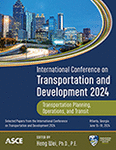On the Impact of Bus Dwelling on Macroscopic Fundamental Diagrams
Publication: International Conference on Transportation and Development 2024
ABSTRACT
Network macroscopic fundamental diagrams (MFDs) have recently been shown to exist in real-world urban traffic networks. When present, MFDs can be used to model traffic dynamics within an urban network by dividing the network into a set of spatially compact homogeneous regions and tracking the average level of congestion in each region. Existing analytical methods to estimate MFD mostly focus on the behavior of a single type of vehicle and do not capture the patterns of mixed traffic (e.g., cars and buses). The existence of buses matters since a bus will block the movements of other vehicles when it dwells at the bus stop. This paper proposes an analytical method to estimate the impact of bus dwelling on a network’s MFD based on the network’s geometric features, traffic control strategies, and bus operation parameters, and validates the performance of the proposed method using simulations based on microscopic traffic models. Comparisons of the analytical and simulation results show that the proposed analytical method can generally provide a good estimate of the lower bound and upper bound of the network’s MFD.
Get full access to this chapter
View all available purchase options and get full access to this chapter.
REFERENCES
Daganzo, C. F. (2007). Urban gridlock: Macroscopic modeling and mitigation approaches. Transportation Research Part B: Methodological, 41(1), 49–62.
Daganzo, C. F., and Geroliminis, N. (2008). An analytical approximation for the macroscopic fundamental diagram of urban traffic. Transportation Research Part B: Methodological, 42(9), 771–781.
Daganzo, C. F., and Knoop, V. L. (2016). Traffic flow on pedestrianized streets. Transportation Research Part B: Methodological, 86, 211–222.
Daganzo, C. F., and Lehe, L. J. (2016). Traffic flow on signalized streets. Transportation Research Part B: Methodological, 90, 56–69.
Dakic, I., Ambühl, L., Schümperlin, O., and Menendez, M. (2020). On the modeling of passenger mobility for stochastic bi-modal urban corridors. Transportation Research Part C: Emerging Technologies, 113(November 2018), 146–163.
Dakic, I., and Menendez, M. (2018). On the use of Lagrangian observations from public transport and probe vehicles to estimate car space-mean speeds in bi-modal urban networks. Transportation Research Part C: Emerging Technologies, 91(April), 317–334.
Deprator, A. J., Hitchcock, O., and Gayah, V. V. (2017). Improving urban street network efficiency by prohibiting conflicting left turns at signalized intersections. Transportation Research Record, 2622(1), 58–69.
Gayah, V. V., and Daganzo, C. F. (2011). Clockwise hysteresis loops in the Macroscopic Fundamental Diagram: An effect of network instability. Transportation Research Part B: Methodological, 45(4), 643–655.
Genser, A., and Kouvelas, A. (2022). Dynamic optimal congestion pricing in multi-region urban networks by application of a Multi-Layer-Neural network. Transportation Research Part C: Emerging Technologies, 134(November 2021), 103485.
Geroliminis, N., and Daganzo, C. F. (2008). Existence of urban-scale macroscopic fundamental diagrams: Some experimental findings. Transportation Research Part B: Methodological, 42(9), 759–770.
Geroliminis, N., Zheng, N., and Ampountolas, K. (2014). A three-dimensional macroscopic fundamental diagram for mixed bi-modal urban networks. Transportation Research Part C: Emerging Technologies, 42, 168–181.
Haddad, J., and Zheng, Z. (2020). Adaptive perimeter control for multi-region accumulation-based models with state delays. Transportation Research Part B: Methodological, 137, 133–153.
Hans, E., Chiabaut, N., and Leclercq, L. (2015). Applying variational theory to travel time estimation on urban arterials. Transportation Research Part B: Methodological, 78, 169–181.
Keyvan-Ekbatani, M., Gao, X., Gayah, V. V., and Knoop, V. L. (2019). Traffic-responsive signals combined with perimeter control: investigating the benefits. Transportmetrica B, 7(1), 1402–1425.
Laval, J. A., and Castrillón, F. (2015). Stochastic approximations for the macroscopic fundamental diagram of urban networks. Transportation Research Part B: Methodological, 81, 904–916.
Liu, W., and Szeto, W. Y. (2020). Learning and managing stochastic network traffic dynamics with an aggregate traffic representation. Transportation Research Part B: Methodological, 137, 19–46.
Loder, A., Bliemer, M. C. J., and Axhausen, K. W. (2022). Optimal pricing and investment in a multi-modal city — Introducing a macroscopic network design problem based on the MFD. Transportation Research Part A: Policy and Practice, 156(November 2021), 113–132.
Saberi, M., Mahmassani, H. S., and Zockaie, A. (2014). Network capacity, traffic instability, and adaptive driving: findings from simulated urban network experiments. EURO Journal on Transportation and Logistics, 3(3–4), 289–308.
Sirmatel, I. I., and Geroliminis, N. (2021). Stabilization of city-scale road traffic networks via macroscopic fundamental diagram-based model predictive perimeter control. Control Engineering Practice, 109(December 2020), 104750.
TCRP (Transit Cooperative Research Program). (1996). : Guidelines for the Location and Design of Bus Stops.
Wu, K., and Guler, S. I. (2018). Optimizing transit signal priority implementation along an arterial. Transportation Research Record, 2672(20), 215–227.
Xu, G., and Gayah, V. V. (2023). Non-unimodal and non-concave relationships in the network Macroscopic Fundamental Diagram caused by hierarchical streets. Transportation Research Part B: Methodological, 173, 203–227.
Xu, G., Yu, Z., and Gayah, V. V. (2020). Analytical method to approximate the impact of turning on the macroscopic fundamental diagram. Transportation Research Record, 2674(9), 933–947.
Xu, G., Zhang, P., Gayah, V. V., and Hu, X. (2023). Opposing Hysteresis Patterns in Flow and Outflow Macroscopic Fundamental Diagrams and Their Implications. Transportation Research Record: Journal of the Transportation Research Board, 2677(8), 100–117.
Yang, K., Menendez, M., and Zheng, N. (2019). Heterogeneity aware urban traffic control in a connected vehicle environment: A joint framework for congestion pricing and perimeter control. Transportation Research Part C: Emerging Technologies, 105(November 2018), 439–455.
Yu, Z., Xu, G., Gayah, V. V., and Christofa, E. (2020). Incorporating phase rotation into a person-based signal timing optimization algorithm. IEEE Transactions on Intelligent Transportation Systems, 23(1), 513–521.
Information & Authors
Information
Published In
History
Published online: Jun 13, 2024
Authors
Metrics & Citations
Metrics
Citations
Download citation
If you have the appropriate software installed, you can download article citation data to the citation manager of your choice. Simply select your manager software from the list below and click Download.
